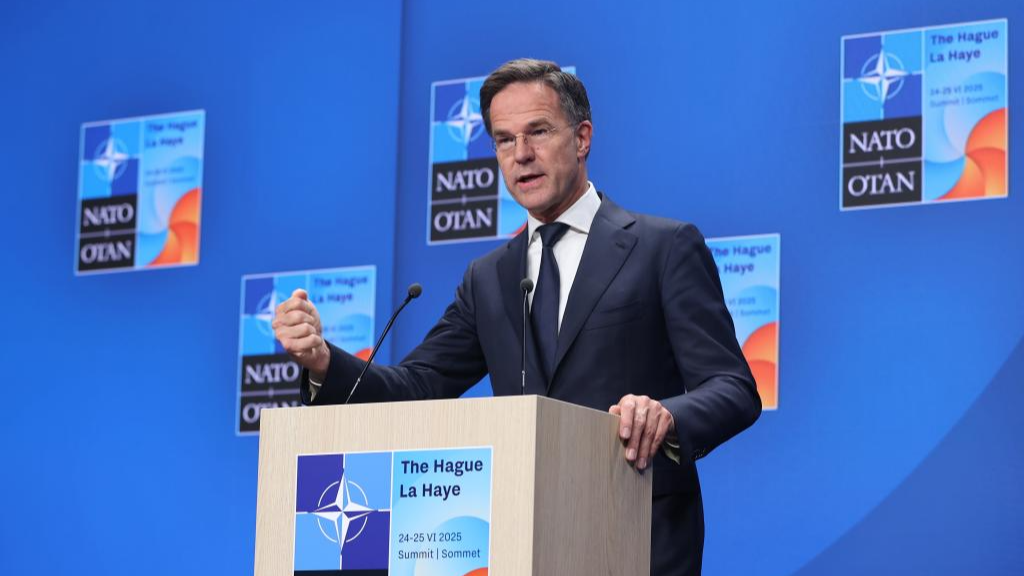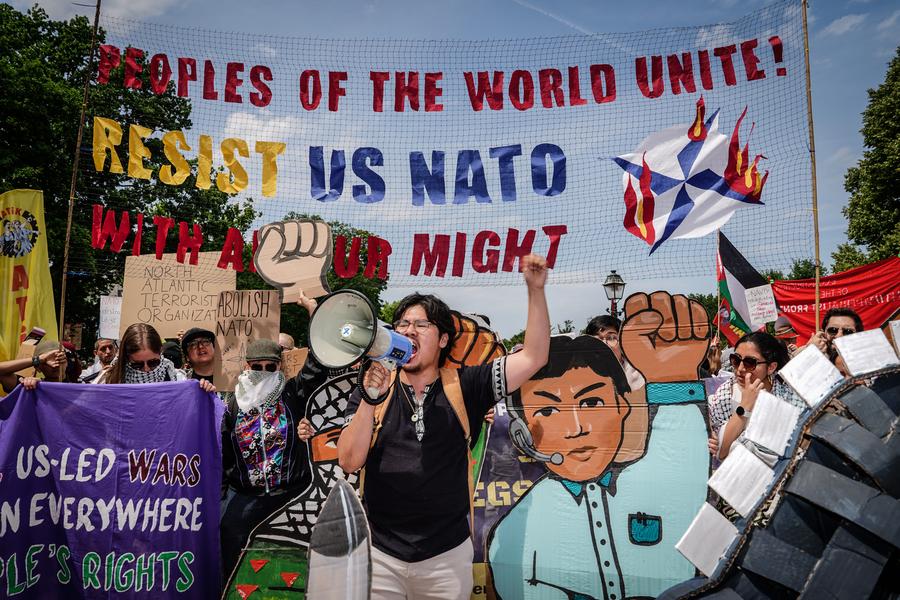LATEST INSIGHTS
Your Present Location: LATEST INSIGHTSNATO's contradictions are mounting
NATO's contradictions are mounting
Source: CGTN Published: 2025-06-25

North Atlantic Treaty Organization (NATO) Secretary General Mark Rutte attends a press conference during the NATO summit in The Hague, the Netherlands, June 25, 2025. /Xinhua
Editor's note: Radhika Desai, a special commentator for CGTN, is a professor of political studies at the University of Manitoba in Canada. The article reflects the author's opinions and not necessarily the views of CGTN.
NATO leaders agreed on June 25 to an increased defense spending goal of 5 percent of each country's GDP, which had been demanded by U.S. President Trump.
NATO never had any defence spending targets until the Ukraine crisis of 2014 when the Obama administration proposed 2 percent in "response" to it. Within a few years, Trump began making vague threats of U.S. withdrawal from NATO if allies failed to raise their defense spending, not least because much of it ended up as new contracts for the U.S. military-industrial complex, thanks to NATO's inter-operability requirements.
With his "America First" and "Make America Great Again" instincts unbridled in his second term, President Trump upped the target to 5 percent in January, following that with a threat to "reinterpret" the Article 5 commitment to collective security.
Obama's two percent target remained largely aspirational but it gave U.S. allies a greater voice. While the U.S. continued playing its outsized role in the alliance, after Trump withdrew troops from Syria without consulting the allies in 2019, French President Emmanuel Macron called NATO "brain-dead."
What a difference six years makes. Today, with Trump threatening withdrawal, not only has NATO General Secretary Mark Rutte corralled NATO members into agreeing to the 5 percent target even when Europe is economically and fiscally far worse off, he has done so while congratulating Trump for "making Europe pay in a big way."
Compelling as this all is in a horrific way, as all this European masochism has been, it does not quite capture the new reality of NATO. There are at least three things to consider.
First, NATO is not a "defensive alliance" but an offensive and imperialist one, fighting against diminution of imperialism's power after the Second World War. It is no wonder it also contained elements of inter-imperialist rivalry even if it gave the appearance of some sort of ultra-imperialist unity.
Not only did the French remain out of NATO's command structures for decades and force the dollar's gold link to be broken; not only did the Germans pursue their Ostpolitik against U.S. demands; not only did, much later, the British join the Asian Infrastructure Investment Bank against the loudly voiced opposition of the Obama administration; but NATO's post Cold War military interventions have involved not NATO itself, but "coalitions of the willing."
The hallowed Article 5, the keystone of collective security, is far looser than most imagine. While it does indeed consider "an armed attack against one or more" member states "an attack against them all," and while in the case of such an attack, it enjoins its members to "assist the Party or Parties so attacked," it requires each member only to take "such action as it deems necessary."

Protesters holding banners and placards are pictured in The Hague, the Netherlands, June 22, 2025. /Xinhua
In effect, if a member country deems it necessary to do no more than make some minimal or tokenistic gesture – one thinks of Germany's initial offer of 5000 helmets to Ukraine as an example – it would have fulfilled its Article 5 commitment.
Secondly, if the U.S.'s NATO allies spend more on their own defence, a new logic is bound to kick in: "Who pays the piper calls the tune." The U.S. led NATO as long as it spent vastly more. Since it can no longer do so, its allies are bound to demand a greater say in its key decision making. Not only will they use it to re-industrialize their own economies, given just how numerous and disunited they are, this greater say can only be cacophonic, giving NATO a more armed and more dangerous incoherence than before.
The Hague summit has papered over this incoherence so far. It has spoken with one voice about the dangers represented by Russia. It has kept its communique extraordinarily brief (just five paragraphs as opposed to the usual dozens). And it has kept alive the hope that either Trump can be flattered and pandered to enough to remain committed to the alliance or that his eventual successor will recommit to the alliance. How long such an "agreement" can last is anyone's guess.
Thirdly, however, there are the people of the NATO member states. Already reeling under the effects of four and a half decades of neoliberalism – social spending cuts, low jobless growth, rising inequality, deterioration of social services – they are close to revolt. The Spanish centre-left government has already opted out of the 5 percent commitment. The British government is facing an unprecedented revolt against a government willing to spend more on guns and less on butter. And Zohran Mamdani's victory in the Democratic primary for the New York mayoral election signified a seismic revolt against both warmongering parties.
Where all this leaves NATO is anyone's guess.
Key Words: NATO























































































 京公网安备 11010802037854号
京公网安备 11010802037854号





